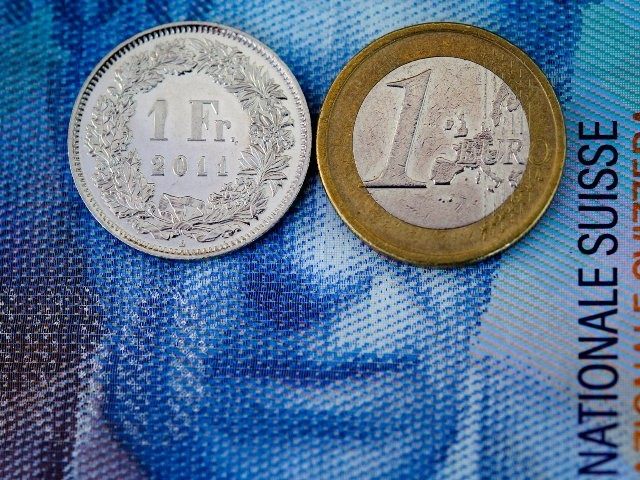Something is brewing in Europe now that has the Swiss National Bank worried.
If you haven’t been paying attention in the last 24 hours, the currency and equity markets have been rocked by a surprise move to delink the existing currency peg between the Euro and the Swiss Franc. This move has set off what many are calling a “financial tsunami” that could leave behind a path of destruction across the continent.
Waking up to find that the local Swiss ATM will not dispense Euros may be viewed as a short-term inconvenience to the average man on the street, but learning that depositing your money in a Swiss bond with maturities of less than 7 years will cost you money, is catastrophic. It is worth repeating, if you lend or deposit your money with the Swiss, they are going to charge you, not pay you.
Negative interest rates are never a sign that things are getting better–quite the opposite. The current yield curve movement indicates a growing concern that things are deteriorating. The further out on the curve the negative rates go, the greater the perceived danger. From the recent moves, many would conclude that Europe is in serious trouble. Yesterday, the Swiss stock market responded by crashing–experiencing its worse daily drop in over two decades, while its currency skyrocketed.
Central bankers gave the market no advanced warning of this decision, raising the specter of “why now?” What is on the horizon to cause such a drastic move since this non-orderly response is akin to running for the exit in a crowded theater before someone yells “fire”? Most currency moves are gradual in nature, like watching a glacier move. This type of disruption has the hallmarks of panic.
The Swiss have been trying for years to manage the imbalance of monetary policies across the Euro zone. Linking together nations like Germany and their irresponsible cousin, Greece, has been a recipe for disaster since inception. The very idea of balanced budgets and fiscal constraint are such foreign concepts among the various participants.
Many would argue that the storm clouds have been building for some time and that the very notion of a lasting unified currency was doomed to fail from the start. The question for most has always been about the timing, and the degree to which Germany, in particular, would continue to carry the other nations who couldn’t stay within the set guidelines of membership. The day of reckoning may be at hand.
Over the last few years, the Swiss balance sheet has ballooned in response to defending their currency, as concerns over the Euro instability grew stronger. First Cyprus, then Greece, and now the overall weakness in many of the EU’s members have many believing that there will be a massive round of quantitative easing unleashed at some future date in response to the deflationary spiral the continent is experiencing. The flight to safety is now on and, for most Europeans, no place is viewed to be safer than Switzerland.
War-gaming this from the sidelines, it appears that the Swiss National Bank believes they will be unable to maintain the currency peg given the size of any upcoming stimulus. Rather than stick around and tie themselves to a sinking ship, it is probably best to man the lifeboats and distance themselves as the geopolitical risks mount.
Previously, the Swiss were obligated to continuously purchase unlimited quantities of Euros to maintain the 1.20 peg that they decided to implement back in September of 2011. Interestingly, this Euro/Franc peg coincided with the nominal high in gold prices, as the world feared that there were increasingly smaller places to park safe money. This decision was not made haphazardly.
Based on their current balance sheet, this move could cost the Swiss government over a $100 billion dollars. This is a move equaling more than 15% of its GDP for an economy the size of Pennsylvania. The broken promise made to maintain the peg has been nothing but expensive talk. The great and powerful central banks of the world have been trumpeting for years that they were omnipotent and more powerful than market forces, but as we have seen, much of their talk has been nothing but smoke and mirrors to placate the public.
The Swiss now look like the architects of the Titanic trying to explain how the policy that they implemented just a few years ago is no longer holding water. After the recent defeat of the gold referendum back in November, the very concerns they gave for not implementing it have now coming home to roost. Gold has been strangely surging ever since the referendums failure. It would be naive to believe that no one outside the SNB knew this was coming.
There is an old joke, “how do you know when a central banker is lying? When his lips are moving.” The next few months will unveil the real reasons for the decision and, more than likely, they will not be for any of the official reasons given today by the Swiss National Bank.
Author’s note: Nothing in this article should be considered an endorsement or recommendation to buy or sell any security.

COMMENTS
Please let us know if you're having issues with commenting.